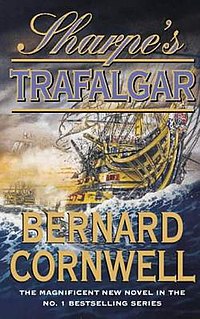This week I'm making a return back to the extremely popular Sharpe series written by Bernard Cornwell. In keeping with my habit I've been reading the books in the series's own chronological order rather than reading them in order of publication. So far I've enjoyed the series and Sharpe's adventures in India, watching him rise to a sergeant and eventually an ensign before being transferred back to England with the 95th Rifles. (And greater fame and glory I have no doubt.) Of course, Sharpe has to get back to England in the first place which means a long ship voyage across two oceans. And Sharpe just so happens to be off the coast of Spain on an October day in 1805.
I will admit I kind of have a problem with this book and I ended up not enjoying it as much as some of the other Sharpe novel's I've read. And I think part of it may be because I'm reading these books in chronological order instead of publication order. For me it's really weird that Sharpe's at Trafalgar at all. I mean, the man's a footslogger, an excellent footslogger, and there's something fascinating about watching him fight on land. (Although I'm sure the fans of the television adaptations will admit Sean Bean isn't hard on the eyes either.) Cornwell himself admits that Sharpe has absolutely no business being at Trafalgar and he sent Sharpe there because he thought it would make an interesting story. On the one hand, it's kind of annoying because it's the Forrest Gump Effect dragging Sharpe into the course of history once again, but on the other it kind of makes sense. Let me explain.
A good example would be the Gaunt's Ghosts series, which is basically Sharpe IN SPACE! And yes, it's interesting to watch Colonel-Commissar Ibram Gaunt and the Tanith First and Only wandering around on a variety of planets and fighting the forces of the Archenemy. But it was somewhere in the middle of reading the second omnibus, The Saint, that I started to get bored with the series. There's just so many ways that you can tell stories about soldiers fighting battles before they start running together. Fortunately in the next omnibus, The Lost, Abnett managed to bring some new and interesting ideas to the series and so kept me interested as a reader. But if you have a long-running series like that it can be a challenge to keep the ideas fresh and interesting. So while Sharpe's Trafalgar is relatively early in the internal chronology, it's later on in the publication order. And for long-time readers of the series it was probably refreshing to see Sharpe do something different instead of the same old battles over and over. For a relatively new reader such as myself, though, it was sort of a weird installment.
I also should warn people that this book has a ton of historical information about the British Royal Navy in it. A lot. As in there are extended expository conversations among the characters about these sorts of things. A character at one point states what it cost to build a ship, down to the penny. It's very obvious that Cornwell did a ton of research in preparation for writing this novel, talking to people at the HMS Victory museum, which is a very good thing if you're writing historical fiction. There's nothing I hate more than historical fiction that gets things downright wrong when it shouldn't, and it's always nice to see how Cornwell has done his research. However it starts spilling over into the book and it almost feels like an information overload. Now, thanks to a certain other series and my many hours logged on Empire Total War I have more than a passing familiarity with the history of the Royal Navy, but I felt like some of the information was just proving how much research Cornwell had done and didn't really contribute to the plot. While I as a history nerd found it all very interesting, I'm sure there are more than one reader who would be overwhelmed.
Unfortunately, for most of the book there just isn't terribly much for Sharpe to do. He's no sailor so he spends most of his time as a passenger, just passing time on ships and finding things to do to occupy his time. Sure, there are things going on but it feels like a distraction until we get to the final big event itself in the last part of the book. Maybe it really captured the tedium of traveling by sailing ship in the early 1800's, but it was a tedium I'd have rather avoided. When it comes to Trafalgar there is plenty of action and the amount of detail is almost excessive. Although personally I'm somewhat surprised considering the amount of carnage that goes on in these books when I find out how relatively light the actual casualties were, at least for the British. You read about ships getting blasted by broadsides and men getting torn apart, but the final tally for the British is just under 1,700 dead and wounded, a tenth of the British force. The combined Spanish and French force, though, loses half their ships and half their men in the battle, a decisive victory for the British indeed.
Overall, I found this book somewhat less enjoyable than the others I've read so far. I know some people really enjoy it and maybe you just have to be an Age of Sail navy fan to really enjoy it. Personally I'm much happier on the land, thank you very much. And if you're not eager to learn a bunch of Royal Navy statistics I'd recommend avoiding this book. If that's your thing then read away, but be prepared for lots of details.
- Kalpar


No comments:
Post a Comment